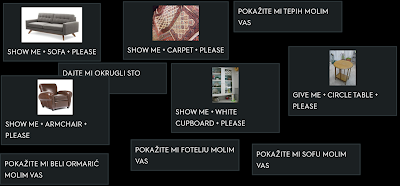Serbian A2 to B2 Video Lesson
Here comes a video lesson which will help you practice Serbian at different levels.
As you can see, there are three phrases.
Serbian A2 Video Lesson - Accusative
The verbs such as TRAŽI - to search VIDETI - to see or VOLETI - to love (jesti, piti, slušati, gledati, kupiti, naći, etc.) trigger the Accusative case endings in the words that follow it (these can be not only nouns, but also numbers and adjectives in front of the noun)
What does ti mean?
It will change the upcoming word(s) in such a way that
- anything that is in singular, ending in -a, will drop the -a and change to -u. For example: čokoladA ... Tražim čokoladU = I am lookin for chocolate :o)
Serbian B1 Video Lesson - Genitive
The following prepositions:
trigger the Genitive case in the words that follow them:
Example: Jaje je pored slaninE. (the nominative case is: slaninA)
Singular:
-anything else >>> -A
- pored - next to
- između - between
- ispred - in front of
- iza - behind
- ispod - under
- iznad - above
trigger the Genitive case in the words that follow them:
Example: Jaje je pored slaninE. (the nominative case is: slaninA)
Singular:
-A>>> -E
slanina - slanine
torta - torte
kruška - kruške
lubenica - lubenice
-anything else >>> -A
mleko - mleka
jaje - jajeTa
đus - đusa
sok - soka
tiganj - tiganja
hleb - hleba
sir - sira
Serbian B1/B2 Video Lesson - If Clauses
(or If I could..., I would... or If I had, I would...)
DA+ PRESENT, JA BIH + GLAGOL+o/la
Da mogu da jedem lubenicu, ja bih je (po)jela.
KAD BIH + GLAGOL+o/la, JA BIH + GLAGOL+o/la
Kad bih mogla da jedem lubenicu, ja bih je pojela. Prevod: If I could eat a watermelon now, I would eat it.
Exercises with Serbian A2 to B2 Video Lessons
If you would like to access a database with more similar video lessons and follow up exercises, you can do so by pledging US$12 though Patreon platform. This way you are supporting regular creation of digital materials for teaching and learning Serbian. These materials range from video lessons, exercises with feedback to textbooks which I regularly send to my Patrons. Hvala!

.png)





























